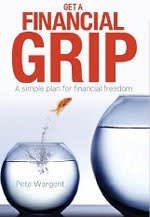How you can retire young through property investment: Pete Wargent

We are living through a period of great volatility. The world’s economies are fragile, and this makes it more important than ever that you have a financial plan to protect yourself.
Despite the gloom that seems to be perpetually portrayed in the financial press, the truth is that recessionary economic times offer outstanding opportunities to those who are prepared.
Wealth has not simply been lost in the global financial crisis; it has been transferred, from the financially uneducated to the sophisticated.
We have had global recessions before, and you can be certain that we will have them again, because economies move in cycles. The facts and the specifics may change, but the patterns are similar.
The losers in financial crises will continue to be the same: those who try to save their cash (inflation will quickly eat away at the value of savings), the inflexible, people with extravagant spending habits, those approaching retirement with much of their wealth in a managed accumulation fund and, particularly, many of those with a total dependence on a job for income.
Having all your eggs in one basket – a job – is a potentially dangerous approach to personal finance.
So who will the winners be? The winners will be those who have the financial education to spot opportunities, and those with multiple income streams. Winners will also include people with moderate spending requirements and those who are prepared to be flexible.
Winners are generally not dependent on highly taxed salaries to increase their wealth. Stock-market meltdowns offer amazing opportunities to those who are able to time the market. Property investors, too, will take advantage of fear to invest counter-cyclically and will capitalise on the low interest rates that often result from a recession.
It is important to be in tune with the financial markets. By the time you read about a hot stock or a flying property market in the media, it is probably too late. Besides, the press print an awful lot of doom and gloom as it seems to sell newspapers. If you believed everything you read in the press you would probably never invest at all.
What is not good enough is to blame the government, your fund manager, or your employer for your financial predicament. You must take responsibility for your own financial health and wellbeing.
One of the seven Buddhist factors of the path to enlightenment is mindfulness, an awareness of reality and clear understanding. Just as to avoid becoming obese we must be mindful of our diet, to become wealthy and financially free we must apply mindfulness to our finances. The first step is accepting that your financial health is your own responsibility.
Why most people can’t quit work young and wealthy
Many people believe that the way in which they will retire will be to build up a lump sum in a superannuation fund that they will withdraw when they are around 65 years of age.
Hopefully, the amount they have built up will last longer than they live. Some of those who have the option to do so consider downsizing their place of residence or using a reverse mortgage to free up some capital.
To me, this is a flawed thought process, and a very risky one for obvious reasons. The risk of the cash running out can be mitigated through selecting an appropriate annuity product, whereby actuarial percentages dictate the level of your annual income based upon your life expectancy.
This mindset shows why most people are unable to be financially free at a young age. The numbers simply don’t stack up.
If you want to retire at 65 the amount you will need as a lump sum is approximately 13 times (see below) your desired retirement income. Therefore, if you want to retire on $100,000 per annum, a lump sum of $1.3 million should be your goal for age 65.
But what if you want to finish working full-time younger than that? Well, naturally, your life outside of the full-time workforce will run for a longer course, so the required multiple of your desired annual earnings increases.
Age at retirement | Required multiple of income |
65 | 13 |
60 | 15 |
55 | 17 |
40 | 25 |
So far, so good, for at least this gives us a target figure. The flaw in this idea, though, soon becomes clear. If you want to quit work entirely at the age of 40 with an annual income of $100,000, you will need a lump sum balance of around $2.5 million.
This is fine in theory. The problem as I see it is that if you are a person who has the financial capability to build a balance that runs into the millions by age 40, you are highly unlikely to be satisfied with an annual income of $100,000.
This is why I believe that what you really need to achieve financial freedom at a young age is a significant balance of net realisable assets – but also a portfolio of assets that continues to grow in perpetuity.
The asset class which gives you the leverage to power ahead is property – particularly residential investment property.

Pete Wargent holds a range of finance and property qualifications and is the author of Get a Financial Grip – a simple plan for financial freedom.
For more on where property fits into your wealth-creation portfolio, sign up for our free webinar on Thursday, November 29 at 12.30.